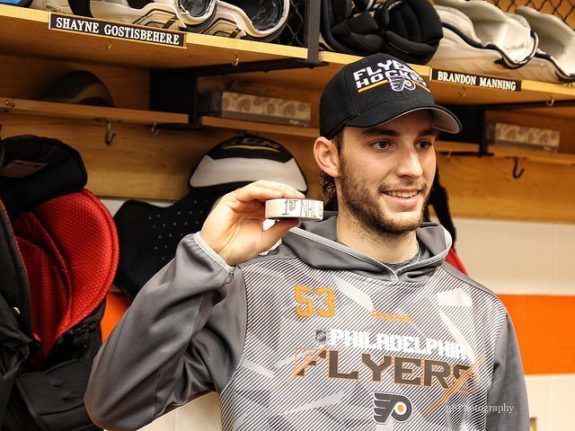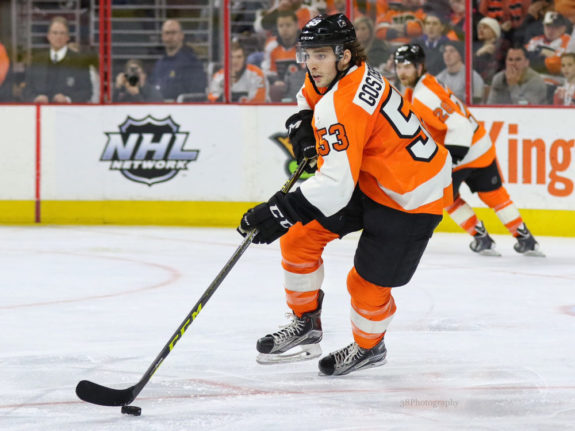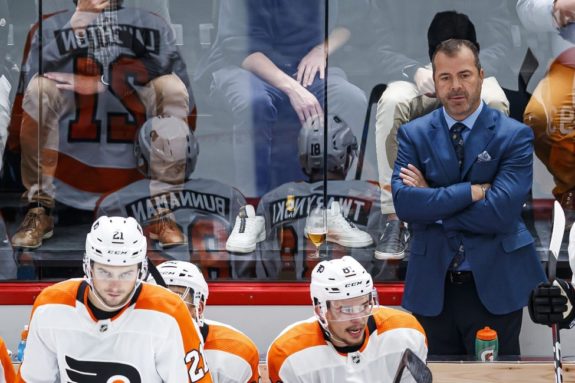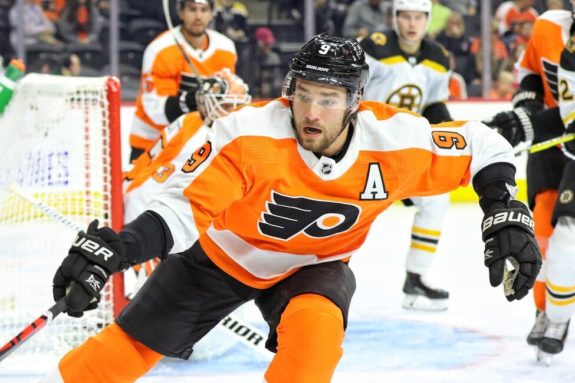The date is Jan. 19, 2016, the Philadelphia Flyers are playing host to the Toronto Maple Leafs. The score is 2-1 in favor of the Leafs, and Shayne Gostisbehere has the puck on his stick. He streaks up the left side of the ice and looks over his options. He briefly considers a pass, but then Leafs captain, Dion Phaneuf, has cut off the passing lane. Ghost has no other option but to shoot, and he does, sneaking the puck through the five-hole of James Reimer. Little did any of us know that this would be the start of a record-breaking 15 game point streak.

After a poor showing in the season prior, the Flyers were proving their doubters wrong and were making a push for the playoffs, partially due to the spark Gostisbehere brought to the team, coupled with his strong play. He finished his first season with 17 goals and 46 points in 64 games. His electrifying rookie campaign would see him finish second in Calder Trophy voting, as rookie of the year, also earning himself consideration for the Norris Trophy, as the best defenseman. At only 23-years-old, it seemed like he had the hockey world at his feet…
Flash forward to the present day, the Flyers have just lost 6-1 to the New York Islanders. Head coach Alain Vigneault announced before the game that Ghost would be a healthy scratch for the third match in a row. What happened to the player who at one point seemed like a future all-star and key piece of the Flyers core going forward, and how did we get to this point?
The Season Thus Far
The 2020-21 season has been a tumultuous one for both Gostibehere and for the Flyers thus far. He found himself unavailable for the team’s season opener against the Pittsburgh Penguins, ailed by COVID-19, and was sidelined for the team’s next five games. Without him, the Flyers managed a respectable 3-2-1 start to the year. But while they’d managed to string together a few wins, they weren’t living up to expectations, having been outplayed in each of their first six games.
Ghost would return to the lineup on Jan. 26 for a road game against the rival New Jersey Devils. Immediately thrust into a significant role, he would play on the first pair with Ivan Provorov and would go on to play a total of 21:57 in his season debut, second only to his partner. While he didn’t set the world ablaze in this game, his play was more than solid. Against the Devils, he would post an expected goals for rating (xGF%) of 71.46% at 5v5, the highest on the team. With Gostisbehere on the ice, the Flyers generated seven high danger scoring chances and allowed only one. Simply put, when he was on the ice, his team was better for it.

With a strong performance in his return, it seemed as if Gostisbehere would be a staple in the team’s lineup for the remainder of the season. Unfortunately, his injection into the defensive corps wasn’t enough to right the sinking ship that was the Flyers. While they managed to climb the standings in late January and in February, the team had some glaring issues. They spent more time chasing after the puck than they did with it on their sticks, their special teams were underperforming, and they were leaking goals at an alarming rate. Fans hoped that a week off due to COVID protocol, followed by a stretch of what seemed to be easy games would give the Flyers a chance to reset and fix the issues that plagued them, but as the team entered March, it was clear that this wouldn’t be the case.
The Flyers’ play in March has been among the worst in the NHL. In their 11 games this month, the team has conceded 52 goals. To put into perspective how bad this is, there are only two other teams that have been scored on more than 40 times over this span, these two teams being the Anaheim Ducks and Buffalo Sabres who both sit in the bottom three of the league’s standings.
Overall, the Flyers’ first half of the season has been a rough one, with struggles from nearly every player, Gostisbehere is no exception to this. He’s never been known for his defensive acumen, but he has been far from being a liability and was hardly the biggest issue with a team defense that, from top to bottom, has been having serious difficulties. (From ‘Flyers Notebook: Defensive problems hounding Flyers and their goalies,’ Delaware County Time, 03/21/2021)
As the season continued, he even started to find his groove, breathing life into the Flyers’ struggling power-play. With Gostisbehere on the ice, the Flyers were nearly always a threat to score, proven by his five goals since February 20th, tied for the most by a defenceman over that span. His play at 5v5 and especially on the power-play proved that he was still the most offensively creative defender in the Flyers’ arsenal, so it was especially baffling to see him sit in the press box during the team’s most recent games.
The Flyers’ run of poor play in March came to a climax with the last three games of their skid. They were assaulted with goals by the New York Rangers in a 9-0 blowout, the team’s biggest loss since October 27, 1981, when they lost 11-2 to Guy Lafleur’s Montreal Canadiens. After a loss like that, one would only expect a change to the Flyers’ defensive lineup for the next game. In a situation like this one, Ghost may not be a significant improvement defensively, although it really can’t get much worse than a 9-0 blow-out, he might bring an offensive spark to a team that failed to score a single goal.
Changes did not come, as Vigneault kept the same six defenders in for the next game against the New York Islanders. This game was better than the previous showing, with the Flyers winning 4-3, but there was still plenty of reason for concern, as the team blew a three-goal lead in the third period before regaining the lead with less than three minutes to go. Again the Flyers’ defense was unchanged after the defensive collapse and narrow win, leading into the following game, also against the Islanders. This next game would result in another disastrous loss, with the Flyers giving up six goals and scoring only one, looking lifeless the entire time.
As the Flyers continue their slide and fall further and further from being in a playoff spot, change has to be made on defense, and soon. With general manager Chuck Fletcher being ever patient on the trade-front, any immediate change will likely have to be internal. Whether Vigneault is ready to give Gostisbehere another chance remains to be seen.
In the Dog House
It’s clear that Gostisbehere has fallen out of favor with Vigneault and it’s because of his defensive play. When asked about the first scratching, he commented that it was because he believed that Ghost’s defensive play was trending downwards. After the decision to scratch the defender again in the following matchup, Vigneault doubled down in saying that his defensive play wasn’t up to par and that he wanted to give the team’s other defencemen another chance.
This isn’t the first time he’s been in the dog house with a coach, resulting in a healthy scratch. Just last year, he found himself in a similar position, with Vigneault sitting him for three games. This time, the scratching was due to an offensive slump. In the six games leading up to his benching, Gostisbehere had recorded zero points and just didn’t look like himself. Upon returning to the lineup, his offense seemed to be at least briefly re-kindled as he potted three goals and four points in his next five games. The Flyers’ bench boss is certainly hoping for a similar effect with the current lineup changes.
Gostisbehere also found himself to be the odd-man-out in last year’s playoffs, where he was kept out of the lineup for two-thirds of the team’s post-season run. When he did get back into the lineup, he was excellent at driving play, despite managing only two points in five post-season games. With the Flyers’ defense performing very well last year without him, the need for him to get back into the lineup wasn’t as pressing of an issue as it is now.

Vigneault isn’t even the first coach that has taken issue with Ghost’s play. He found himself scratched multiple times under the Flyers’ former coach Dave Hakstol. These scratchings were usually for the same reason as the current ones, with blame falling upon his defensive game. The reactions to Hakstol’s decisions to keep the defender out of the lineup were met with similar vitriol to Vigneault’s scratchings, with the fanbase being both angered and baffled by the decision.
The Alternatives
Moving forward, Gostisbehere needs to find his way back into the lineup. With the Flyers’ lack of scoring in the recent games he’s missed, they simply can’t afford to continue to sit him. It’s clear to see that the team has been sorely missing their most creative and offensively gifted blueliner, and despite his shortcomings in his own end, he’s at worst equal to the players that they have been icing.
With Robert Hagg also out of the lineup due to injury, the alternatives to Gostisbehere are Erik Gustafsson and Nate Prosser, neither of whom have been very appealing as of late. In the most recent game against the Islanders, they both played horrid defense, coughing up three bad turnovers each. Their positioning and decisions with the puck directly led to multiple Islanders’ goals.
Gustafsson plays a similar, offense-first, game to Gostisbehere, but what Ghost brings to the table over him, is his ability to play a more significant role for the Flyers. Having played more than half of his minutes at 5v5 this season on the top pairing with Provorov, the two of them have been the Flyers’ best regular defensive duo in 2020-21. The pair holds an xGF% of 51.82%, and their team generates more high-danger chances than the opposition when they’re out on the ice, despite starting the majority of their shifts in their own end. Until the Flyers can find a replacement for Matt Niskanen, who retired last offseason, Ghost is the best option to fit next to Provorov on the top-pair. Gustafsson can also benefit the team if deployed properly and given sheltered minutes, but he shouldn’t be seen as a replacement for Gostisbehere.

Prosser on the other hand has yet to demonstrate that he belongs in the lineup. This season, opposing teams have managed to more than double the Flyers in scoring chances when Prosser is on the ice, and with him out there, they have been outscored 9-2. His on-ice impact has been overwhelmingly negative, demonstrated by his xGF% of 33.3%, the third-worst in the NHL amongst defencemen that have played at least 50 minutes at 5v5. Making matters worse, opposing teams have averaged a goal every 8.5 minutes that Prosser is on the ice. Scratching Gostisbehere in favor of Gustafsson makes little sense, but playing Prosser over him simply cannot be justified.
The constant rotation team’s defense shouldn’t be the solution going forward. This defensive carousel may have a detrimental effect on the confidence of Flyers’ players, potentially hindering their ability to get comfortable out of fear of making a mistake leading to a scratch.
Moving Forward
Gostisbehere is a very talented player without a shadow of a doubt. One doesn’t earn Norris Trophy votes or score 60+ points in a season without boatloads of talent. Yet time and time again, he’s fallen out of favor with his coaches. While his offensive and occasionally risky playstyle can result in pucks ending up in the back of his own net, he outweighs the issues in his game by creating a multitude of offensive chances for the Flyers, and by providing a spark to the team’s power-play that they’ve struggled to find elsewhere.
When he’s been in the lineup this season, the Flyers have had stronger performances offensively and in terms of puck possession. Across all situations, his team’s expected goal rate sees nearly a nine percent improvement with him on the ice. Simply put, the Flyers are a better team with him playing. If the coaching and managerial staff are unable to see the benefit he has on the team, then it may be best for them to move on from him and trade him to a team that can.